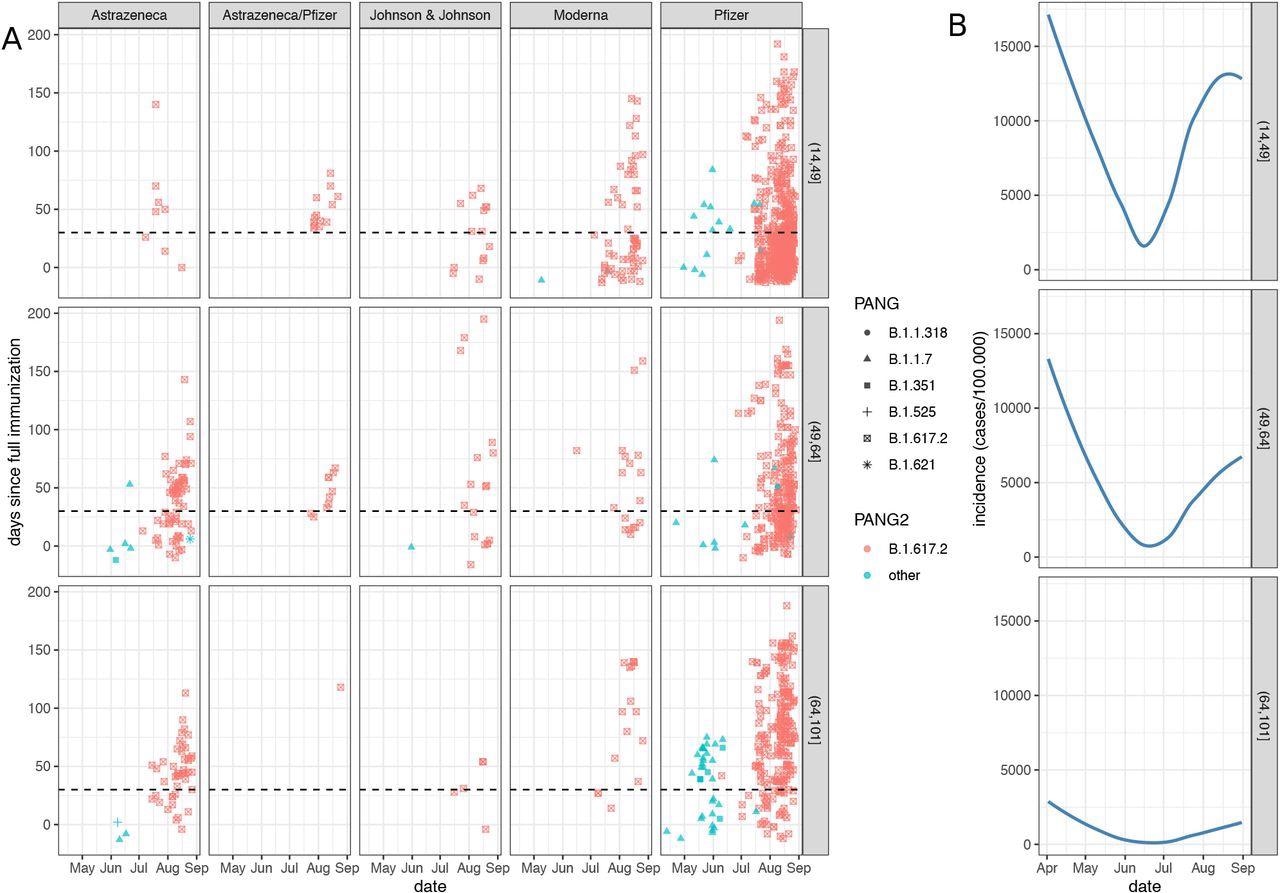The evolution of the severe acute respiratory syndrome coronavirus-2 (SARS-CoV-2), due to mutations, has resulted in the emergence of many variants. Many of the SARS-CoV-2 variants have been reported to be more virulent than the original strain and have been classified as variants of concern (VOC) and variants of interest (VOI).
Among the SARS-CoV-2 VOCs, the Delta variant has proved to be highly transmissible and able to evade the immune protection induced through both natural infection and coronavirus disease 2019 (COVID-19) vaccination. Recently, several reports on vaccine breakthrough infections are available, which have questioned the efficacy of available COVID-19 vaccines against SARS-CoV-2 variants.

Study: Investigation of Vaccine Breakthrough Infections by Vaccine strategy during the Delta Variant Wave in France. Image Credit: AePatt Journey / Shutterstock.com

 This news article was a review of a preliminary scientific report that had not undergone peer-review at the time of publication. Since its initial publication, the scientific report has now been peer reviewed and accepted for publication in a Scientific Journal. Links to the preliminary and peer-reviewed reports are available in the Sources section at the bottom of this article. View Sources
This news article was a review of a preliminary scientific report that had not undergone peer-review at the time of publication. Since its initial publication, the scientific report has now been peer reviewed and accepted for publication in a Scientific Journal. Links to the preliminary and peer-reviewed reports are available in the Sources section at the bottom of this article. View Sources
About the study
In France, more than 89% of the eligible population has been completely vaccinated with different vaccine strategies. When this study was conducted at the national reference center for respiratory viruses in Lyon, France, many researchers had been informed about SARS-CoV-2 Delta variant breakthrough infections (VBIs) with high viral load.
Many studies have also indicated that the duration and level of humoral and cellular immune responses varied with the type of vaccine administered. In this observational study, which is now available on the medRxiv* preprint server, scientists have described the characteristics of VBIs in fully vaccinated individuals in France. The participants were vaccinated following any of the five different vaccine strategies.
In the current study, scientists collected SARS-CoV-2 positive samples from the Biogroup community testing laboratories where entire genomic sequencing was available. One of the criteria followed by the researchers during sample collection was that all the participants must test positive for SARS-CoV-2 at least two weeks after being fully vaccinated.
These participants received homologous vaccination with Pfizer-BioNTech (BNT162b2) or Moderna (mRNA 1273) vaccines. Homologous vaccination means receiving two doses of the same type of vaccine.
The third group of participants was vaccinated with heterologous vaccination with AstraZeneca and Pfizer-BioNTech (ChadOx1/BNT162b2). Another group received single-dose vaccines of Johnson & Johnson (Ad26.COV2.S) or AstraZeneca (ChadOx1) vaccines. This study has been registered in ClinicalTrials.gov.
Study findings
The current study included a total of 1,630 VBIs from patients who were fully vaccinated between the months of February and July 2021. The authors sequenced 1,366 samples and reported that 94.1% of the sample represented the Delta variant.
Among the Delta-VBIs, individuals vaccinated with BNT162b2 were found to be the most frequently reported vaccine breakthrough candidate (79.1%), followed by ChadOx1 (9.2%) and mRNA-1273 (7.0%).
 NGS-confirmed vaccine breakthrough infections in fully vaccinated individuals, April, 12th to August, 30th A. Vaccine breakthrough infections (VBI) are represented by vaccine strategy and by age group. The delay since full immunization are represented in the y-axis. The horizontal dotted lines indicate the delay of one month following the full immunization. VBI represented below these lines is defined as early VBI. Each Pango lineage determined by whole-genome sequencing is represented by a symbol. Lineage B.1.617.2 (Delta variant) is represented in red. B. Incidence of COVID-19 cases in France is represented by age group 6.
NGS-confirmed vaccine breakthrough infections in fully vaccinated individuals, April, 12th to August, 30th A. Vaccine breakthrough infections (VBI) are represented by vaccine strategy and by age group. The delay since full immunization are represented in the y-axis. The horizontal dotted lines indicate the delay of one month following the full immunization. VBI represented below these lines is defined as early VBI. Each Pango lineage determined by whole-genome sequencing is represented by a symbol. Lineage B.1.617.2 (Delta variant) is represented in red. B. Incidence of COVID-19 cases in France is represented by age group 6.
In France, the number of VBIs in each age group spiked during mid-August. However, the median age of the Delta-VBI cases differed significantly based on the vaccine strategy. This study reported that the Delta-VBI predominantly showed mild symptoms with no difference depending on the vaccine strategy.
The median reverse-transcription polymerase chain reaction (RT-PCR) cycle threshold values at the time of the diagnosis were significantly different between symptomatic and asymptomatic cases only for the BNT162b2 group. Interestingly, this study found that over 75% of Delta-VBI occurred within three months of vaccination, irrespective of the vaccination strategy.
Additionally, researchers observed that 50% of VBIs occurred less than one month after an individual completed the two-dose vaccination regime. This study revealed that VBIs were mostly found among younger age groups, which might be due to the relaxation of barrier gestures.
Conclusions
The authors have highlighted some of the shortcomings of this study, which include limitations related to the French vaccination policies. For instance, limited sample sizes for non-messenger ribonucleic acid (RNA) vaccines and the large difference in vaccination rates across different age groups.
The current study reports that mild VBIs were detected in community laboratories during the spread of the Delta variant. Scientists further reported that VBIs mainly occurred within three months after full immunization, irrespective of the type of vaccines administered. Overall, the scientists recommended the continuation of surveillance of VBIs to understand the efficacy of the booster vaccination strategy.

 This news article was a review of a preliminary scientific report that had not undergone peer-review at the time of publication. Since its initial publication, the scientific report has now been peer reviewed and accepted for publication in a Scientific Journal. Links to the preliminary and peer-reviewed reports are available in the Sources section at the bottom of this article. View Sources
This news article was a review of a preliminary scientific report that had not undergone peer-review at the time of publication. Since its initial publication, the scientific report has now been peer reviewed and accepted for publication in a Scientific Journal. Links to the preliminary and peer-reviewed reports are available in the Sources section at the bottom of this article. View Sources
Journal references:
- Preliminary scientific report.
Bal, A., Destras, G., Simon, B., et al. (2021) Investigation of Vaccine Breakthrough Infections by Vaccine strategy during the Delta Variant Wave in France. medRxiv. doi:10.1101/2021.12.05.21267301. https://www.medrxiv.org/content/10.1101/2021.12.05.21267301v1.full-text.
- Peer reviewed and published scientific report.
Bal, Antonin, Grégory Destras, Bruno Simon, Jean-Marc Giannoli, Florence Morfin, Bruno Lina, and Laurence Josset. 2022. “Investigation of Vaccine Breakthrough Infections by Vaccination Scheme during the Delta Variant Wave in France.” Clinical Microbiology and Infection, March. https://doi.org/10.1016/j.cmi.2022.02.034. https://www.clinicalmicrobiologyandinfection.com/article/S1198-743X(22)00111-2/fulltext.